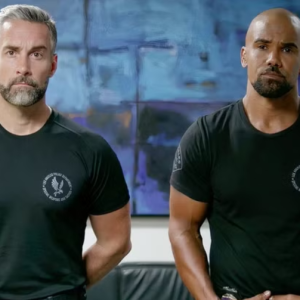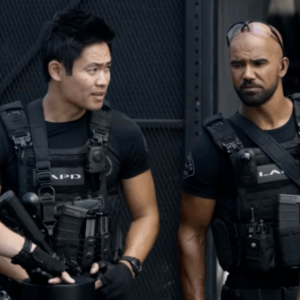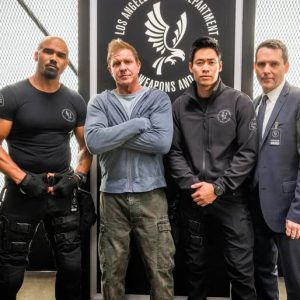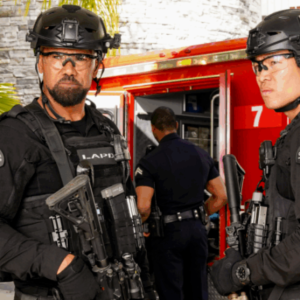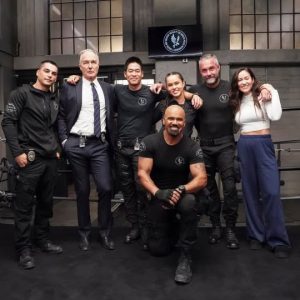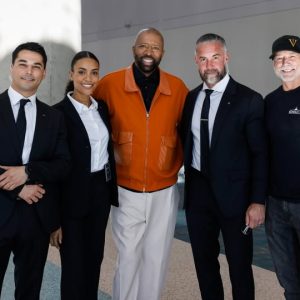In early 2017, CBS embarked on an ambitious endeavor: a police drama reboot inspired by the 2003 film S.W.A.T. More than a simple nostalgia play, this new iteration was meticulously reimagined for contemporary audiences, striving to reflect the complexities of modern law enforcement and the diverse communities it serves. Central to its immediate resonance and enduring success was the astute casting of its core ensemble, particularly the choices of Shemar Moore as the charismatic Daniel “Hondo” Harrelson, and the pivotal additions of Lina Esco and Kenny Johnson, whose chemistry and depth would lay the foundational bedrock for a series that quickly transcended the typical procedural.
Shemar Moore’s Hondo was envisioned as a turquoise-nerved lieutenant, navigating the often-conflicting loyalties between his deeply rooted neighborhood and his demanding duty to the elite S.W.A.T. team. His character became the moral compass and the empathetic bridge between the police force and the community, often questioning protocols and fighting for justice on both sides of the divide. This internal conflict, coupled with Moore’s commanding yet approachable presence, provided a unique lens through which the series could explore sensitive social issues.
The casting extended beyond Hondo, cementing the ensemble’s authentic feel. Lina Esco brought a magnetic intensity to Officer Christina “Chris” Alonso, a character designed to echo Michelle Rodriguez’s role in the original film but infused with a quiet strength and groundbreaking complexity that made her entirely her own. Chris emerged as a rock-solid, calm-under-pressure fighter, adept at navigating volatile situations and internal team politics with unyielding grit. Her journey within the series was one of profound personal and professional growth, making her one of television’s most nuanced portrayals of a queer Latina officer. Her dedication to her team was matched only by her commitment to integrity and her unwavering pursuit of personal authenticity, even when it meant challenging the status quo.
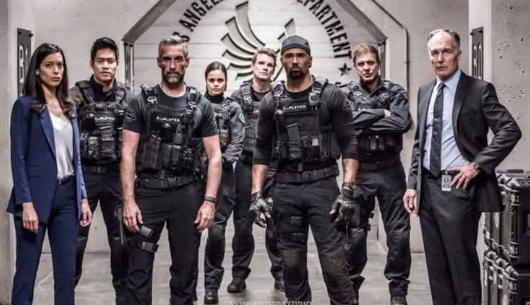
Kenny Johnson, celebrated for his raw performances in series like The Shield and Bates Motel, encapsulated the pilot’s street-smart edge as Dominique Luca, the team’s indispensable expert driver. Johnson imbued Luca with a compelling mix of unwavering loyalty and understated intensity, traits perfectly suited for a show built on trust under extreme pressure. Luca often served as the pragmatic voice, a skilled operative whose expertise behind the wheel was matched by his deep understanding of L.A.’s intricate urban landscape. His blue-collar background and dedication to his craft resonated deeply, grounding the high-octane action in relatable, everyday heroism.
Behind the camera, CBS assembled a formidable creative powerhouse. Aaron Rahsaan Thomas and Shawn Ryan co-wrote the pilot, meticulously crafting a narrative that blended intense action with profound emotional depth. The involvement of Justin Lin, the maestro behind the Fast & Furious franchise, as director, ensured the pilot burst forth with high-octane polish and cinematic flair, setting a visual standard that the series strived to maintain. Executive producers Neal H. Moritz and Thomas rounded out the team, instrumental in shaping the show’s dynamic pulse and ensuring its longevity.
The rapid greenlighting of the pilot in February 2017, followed by a full series order by mid-May, underscored CBS’s confidence. When S.W.A.T. officially debuted on November 2, 2017, it swiftly captivated audiences with its unique blend of intense, heartfelt storytelling and a powerful, cohesive ensemble.
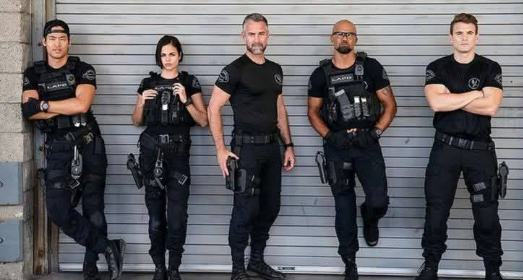
The impact of Esco and Johnson on the S.W.A.T. formula was immediate and profound. Their casting added layers that broke free from stereotypical cop drama roles. Esco’s Chris, as a Latina, bisexual officer, brought much-needed representation and a rich tapestry of personal struggles and triumphs that resonated deeply with viewers. Her storylines delved into the challenges of identity, belonging, and breaking barriers within a traditionally rigid environment, showcasing her resilience as she navigated difficult relationships and ultimately found her voice. Johnson’s textured presence, meanwhile, delivered a character embodying loyalty with a gritty edge, mirroring the layered realities of L.A.’s diverse streets and the blue-collar dedication often overlooked in such narratives.
Crucially, their chemistry with Moore’s Hondo elevated the show’s emotional stakes exponentially. Hondo wasn’t merely a team leader; he was a community protector operating amidst fractured societal ties, and Chris and Luca served as vital extensions of his mission. Their performances grounded the hyper-tense action sequences in a relatable humanity, making the stakes feel personal and the character bonds genuinely earned. The series thrived on this believable camaraderie, portraying the S.W.A.T. unit not just as an elite tactical team, but as a tight-knit family facing extraordinary challenges together.
Beyond the core trio, the ensemble’s strength was further bolstered by characters like David “Deacon” Kay (Jay Harrington), the seasoned veteran and family man who served as Hondo’s trusted second-in-command, often balancing his unwavering duty with profound personal faith. Jim Street (Alex Russell), the hot-headed but brilliant newcomer, embarked on a tumultuous journey of redemption and self-discovery, evolving from a reckless individualist to a dedicated team player. Victor Tan (David Lim) offered a blend of street smarts and technology prowess, grounding the team with his quick wit and unwavering loyalty. Together, this diverse group formed a cohesive unit, demonstrating the importance of trust, communication, and mutual respect in high-pressure situations.
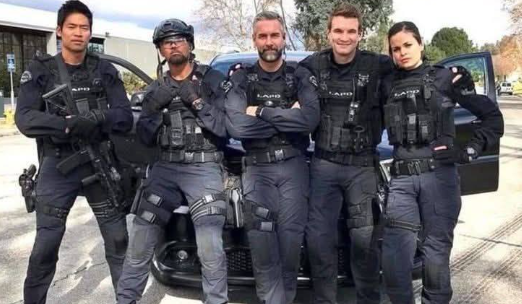
S.W.A.T. distinguished itself by actively engaging with contemporary social issues that often plague law enforcement in real life. From discussions on police brutality and racial injustice to community outreach programs and the complexities of socio-economic disparities, the show consistently used its platform to foster dialogue and present multifaceted perspectives. Hondo, in particular, often found himself at the forefront of these discussions, using his unique position to bridge divides and advocate for reform, adding significant depth to the action-packed narrative. The series often explored the ethical dilemmas faced by officers, forcing characters and viewers alike to confront difficult truths about justice, accountability, and the role of police in society.
The show’s ability to balance high-octane action with heartfelt character drama is a testament to its enduring appeal. Each episode presented a new, high-stakes threat, from intricate terrorist plots and organized crime syndicates to volatile domestic disputes and international crises. The tactical precision and intense choreography of the S.W.A.T. operations kept viewers on the edge of their seats, while the parallel focus on the personal lives and emotional journeys of the team members ensured that the audience remained deeply invested in their fates. This blend of adrenaline and genuine human emotion became the signature “S.W.A.T. formula,” allowing it to explore themes of loyalty, sacrifice, redemption, and the unbreakable bonds forged under fire.
Looking back on what would become eight seasons and over 163 episodes, it’s clear that the pilot’s carefully calibrated dialect—equal parts adrenaline and heart—set the unwavering tone. Without Esco and Johnson anchoring the ensemble, S.W.A.T. might have been just another glossy procedural. Instead, it became their show as much as Moore’s, imbued with soul, swagger, and a profound sense of purpose.

Though both stars eventually departed the series—Esco in season 6, followed soon after by Johnson—their indelible mark never faded. Esco’s character, Chris, embarked on a new path, dedicating herself to helping young women in safe houses, a fitting evolution for a character who always championed the vulnerable. Johnson’s Luca, after a devastating injury, found new purpose beyond active duty, reflecting the show’s commitment to realistic character arcs. The series continued to evolve, introducing new dynamics and characters to fill the void, but those original dynamics established in the pilot remained iconic. They anchored an L.A. squad that became synonymous with family, and their absence, though deeply felt, served as a poignant reminder of the powerful bonds they had helped forge.
When CBS decided to reboot S.W.A.T., they didn’t just cast a show; they meticulously built a legacy. Lina Esco and Kenny Johnson, alongside Shemar Moore, brought authenticity, edge, and heartfelt humanity to a gritty procedural world. Backed by visionary creators and a dedicated team, their individual contributions and collective chemistry helped elevate the series from a trod storyline to a cultural touchstone. They didn’t merely join the mission; they defined it, creating a compelling narrative that resonated with millions and cemented S.W.A.T.’s place as one of the most impactful police dramas of its time.
